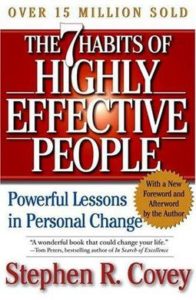When exploring any topic – in this case abundance thinking – it is always a good idea to start with a definition or at least a framework upon which to begin one’s exploration.
 According to Wikipedia, in his book, ‘The 7 Habits of Highly Effective People’, Stephen “Covey coined the idea of abundance mentality or abundance mindset, a concept in which a person believes there are enough resources and successes to share with others. He contrasts it with the scarcity mindset (i.e., destructive and unnecessary competition), which is founded on the idea that, if someone else wins or is successful in a situation, that means you lose; not considering the possibility of all parties winning (in some way or another) in a given situation (see zero-sum game). Individuals with an abundance mentality reject the notion of zero-sum games and are able to celebrate the success of others rather than feel threatened by it.”
According to Wikipedia, in his book, ‘The 7 Habits of Highly Effective People’, Stephen “Covey coined the idea of abundance mentality or abundance mindset, a concept in which a person believes there are enough resources and successes to share with others. He contrasts it with the scarcity mindset (i.e., destructive and unnecessary competition), which is founded on the idea that, if someone else wins or is successful in a situation, that means you lose; not considering the possibility of all parties winning (in some way or another) in a given situation (see zero-sum game). Individuals with an abundance mentality reject the notion of zero-sum games and are able to celebrate the success of others rather than feel threatened by it.”
Look around you…
Chances are you will see more scarcity mindset than abundance. There are advertisements telling us that if we don’t get in now, we will miss out. Television shows based on one person wins and the rest lost. Commercials telling us how devastated our families will be if we don’t do this or do that, and do it now.
We have built a culture where marketers largely rely on ‘scarcity thinking’ to drive fear-based purchases and actions.
It is relatively easy to identify scarcity thinking, but what about abundance thinking..?
What is abundance thinking and how do we recognise it?
Abundance thinking is essentially looking at the strengths, successes, and possibilities that surround you – not once, but on a continual basis.
Abundance-focused leaders do not ignore weaknesses, but they put the majority of their focus on the strengths and successes of their teams. They do not frame their challenges in terms of not having enough time, money, energy or resources to achieve their goals. As a result their people focus on growth, new frontiers, and embracing change.
When in 1961 President Kennedy committed the nation to landing a man on the moon before 1970, NASA did not even know if it had the technology to achieve such a daring and audacious goal – but they did it! Kennedy focused on the possibilities, not the limitations.
 I recall hearing a quote by President Nixon as he was staring at a photo of Kennedy that I believe came from a movie (I don’t know if Nixon actually said it, but it resonates regardless):
I recall hearing a quote by President Nixon as he was staring at a photo of Kennedy that I believe came from a movie (I don’t know if Nixon actually said it, but it resonates regardless):
“When they look at you, they see what they want to be. When they look at me, they see what they are.”
Possibly the best description I have found on applying the attributes of abundance thinking is the work of Cooperrider and Whitney in their “A Positive Revolution in Change: Appreciative Inquiry”:
| Principle | Summary | Details |
|---|---|---|
| Constructionist Principle | Words create worlds | Reality, as we know it, is a subjective vs. objective state and is socially created through language and conversations. |
| Simultaneity Principle | Inquiry creates change | The moment we ask a question, we begin to create a change. “The questions we ask are fateful.” |
| Poetic Principle | We can choose what we study | Teams and organizations, like open books, are endless sources of study and learning. What we choose to study makes a difference. It describes – even creates – the world as we know it. |
| Anticipatory Principle | Images inspire action | Human systems move in the direction of their images of the future. The more positive and hopeful the image of the future, the more positive the present-day action. |
| Positive Principle | Positive questions lead to positive change | Momentum for [small or] large-scale change requires large amounts of positive affect and social bonding. This momentum is best generated through positive questions that amplify the positive core |

Comparing scarcity vs abundance
Here is Stephen Covey’s take on the scarcity mindset:
Most people are deeply scripted in what I call the Scarcity Mentality. They see life as having only so much, as though there were only one pie out there. And if someone were to get a big piece of the pie, it would mean less for everybody else.
The Scarcity Mentality is the zero-sum paradigm of life. People with a Scarcity Mentality have a very difficult time sharing recognition and credit, power or profit – even with those who help in the production. The also have a a very hard time being genuinely happy for the success of other people.
Here is how Covey describes abundance thinking:
The Abundance Mentality, on the other hand, flows out of a deep inner sense of personal worth and security. It is the paradigm that there is plenty out there and enough to spare for everybody. It results in sharing of prestige, of recognition, of profits, of decision making. It opens possibilities, options, alternatives, and creativity.
So, what is the problem?
The problem is that we tend to only notice the things upon which we focus – and if you agreed with the earlier statement that when you look around you, you see more scarcity than abundance – you my friend are focused on scarcity.
…and thanks to how your brain works, you get more of that upon which you focus!
For instance, imagine you are buying a new car and have decided on a yellow VW Beetle since you haven’t ever seen a yellow one except in the brochures. As you drive your brand new, very distinctive car off the lot and home, you pass five of them!
Blame your reticular activating system!
The reticular activating system, or RAS, is a part of the brain into which all of your senses except smell are wired. Its job is to essentially be a gatekeeper and filter the massive amounts of information that are constantly bombarding your senses.
With all the literally millions of sensory inputs to which our brain is subjected, it is little wonder there is a mechanism to funnel out what is not important – but it is us who decides what is important!
The simple fact is that if we do not consciously focus upon something, we often miss it entirely.
Most people have seen the Harvard study where they showed people a video of a small basketball team passing a ball around in a circle. Participants were asked the count the number of times the ball was passed. Simple enough.
After the video, the participants were asked if they had noticed anything unusual – over half reported they had not seen anything unusual (and were a little perplexed by the question).
I won’t give it away for those who haven’t seen it: http://www.theinvisiblegorilla.com/gorilla_experiment.html
Because the brain had been asked to focus on the passing of the ball, in more than 50% of the participants, it missed something rather extraordinary.
…and so it is in our day to day life – whether at work or at play.

We only notice that upon which we focus!
…and when you have abundance thinking, you are focused on abundance – it is that simple. Not easy, but simple.
| Abundance thinkers: | Scarcity thinkers: |
| Believe in positive possibilities | Are pessimistic about the future |
| Think big | Think small |
| Encourage others | Find fault in others |
| Understand that everything that happens in their world (positive and negative) is of their creation | Blame others for their circumstances |
| Believe there is always more | Believe there is never enough and one needs to fight for more |
| Willingly share their knowledge and contacts with others | Carefully guard their knowledge and contacts, only sharing when they feel they will directly behefit |
| Withhold judgement | Judge others regularly |
| Trust people until proven untrustworthy | Distrust until proven trustworthy |
| Are inwardly confident, self-assured and appreciative | Lack self-confidence and display ‘entitled’ and often selfish behaviour |
| Welcome competition as a means to grow, develop and expand | See competition as a necessary evil and seek to destroy the |
| Are open, honest, warm and welcoming | May appear warm and welcoming, but often undermining those in their acquaintence |
| Believes collaboration is the way forward | Believes competition is the only way |
| Has no fear of being replaced because they focus on what is best for all, not just themselves | Afraid of being replaced |
| Embraces change | Fears and disrupts change |
| Inspire others | Condescend others |
| Know failure is a step toward success | Fear failure |
| Do not engage in gossip, or complaining about people to others | Talk negatively about people to others, often thinking they are being constructive |
| Ask themselves, ‘how can I be of service?’ | Ask themselves, ‘what’s in it for me?’ |

In the end, abundance thinking all comes back to one of my role models – Yoda:
~ Bella


